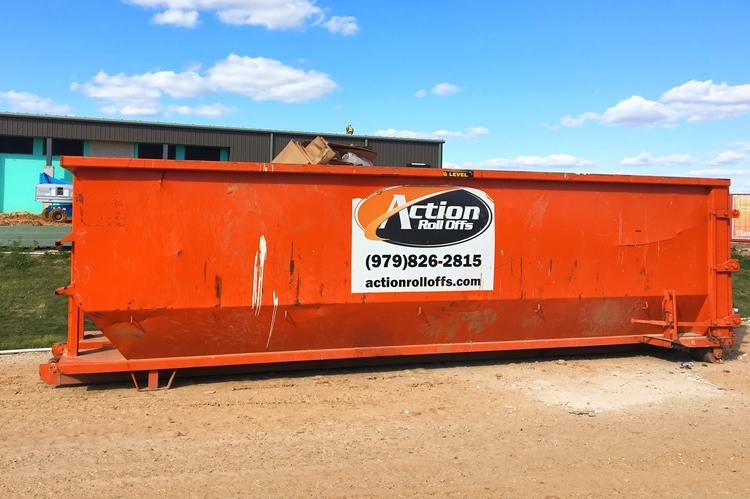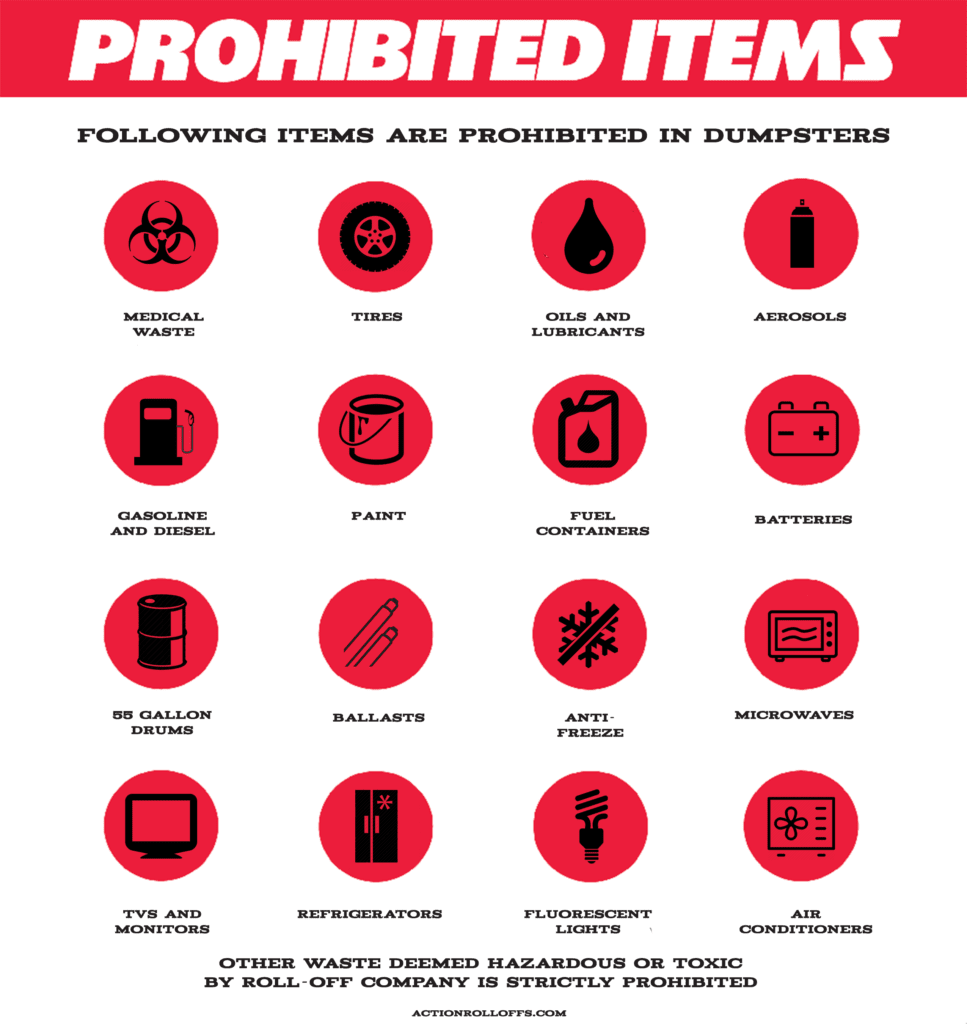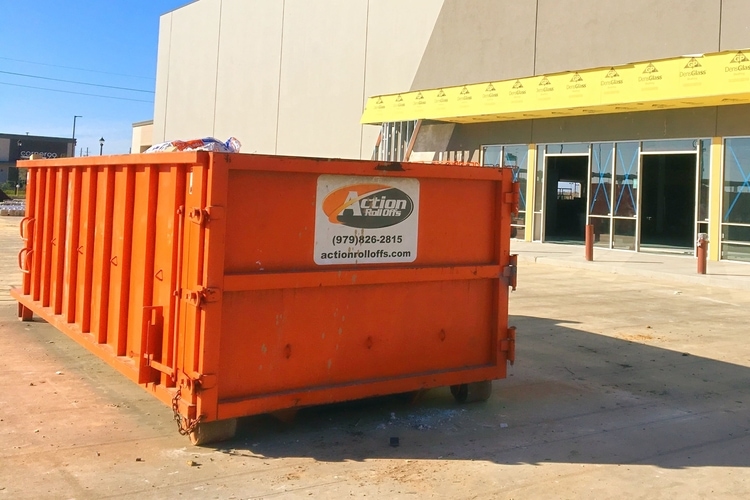What You Can And Cannot Put In A Roll-Off Dumpster
Hiring a roll off dumpster is a convenient and practical way to dispose of a large variety of trash, junk, rubble and other items that are simply unwanted. However, there is a list of items that you can put in a dumpster and another list of items that should never be placed on the dumpster.
These items can differ from one rental company to another as well as according to the local rules and regulations that place restrictions on the types of junk that can be disposed of in a dumpster in Houston, Texas. It is recommended to get the lists of what is allowed and what is prohibited from your specific dumpster rental provider or call the local regulatory authority in your area.
What can and cannot be placed in a dumpster may also depend on the size and type of dumpster that you rent. Due to state and federal weight restrictions on the roads certain items, or an abundance of certain items cannot be put in larger dumpsters.

What You CAN Put In A Roll Off Dumpster
The following waste/debris is acceptable for a roll off dumpster:
- Household items such as wooden furniture, toys, clothing, books, and so on and so forth. These items normally need to be disposed of as a result of a house clean-out, spring clean or extreme declutter. Learn more about residential dumpster rentals in our blog.
- Household appliances are usually allowed in a dumpster. Some dumpster rental companies may charge an additional fee for certain appliances. It is always a good idea to call the rental company to confirm what appliances can be placed in the dumpster and what (if any) additional fees may apply.
- Electronics follow similar rules as to household appliances. Some electronics are sometimes allowed at an additional cost. Call ahead before placing electronics in a dumpster.
- Construction debris and building materials produced from a new construction or home improvement project including:
- Bricks, concrete and asphalt.
- Lumber or timber (wood).
- Roof shingles or tiles (some locations require shingles to be recycled and they therefore cannot be placed in a dumpster).
- Any other building materials and debris that remain after the construction project.
- Storm debris left behind from storm damage after a natural disaster.
- Aerosol cans may be disposed of in a dumpster if they are empty.
- Upholstered furniture like sofas or chairs covered with fabric can be disposed of in dumpsters in some locations. Find out about local regulations in your area from your dumpster rental provider.
- Bed mattresses and box springs are only allowed in dumpsters in certain localities. This is because these items need to be broken down before they can be disposed of by the rental company. You can probably expect to pay a fee for each mattress or box spring that is placed in the dumpster to cover the breakdown and disposal costs. Call to find out if mattresses are allowed in your area and what the cost involved will be.
- Yard waste and garden refuse which refers to raked up leaves, tree limbs, mowed lawn and shrubs are generally allowed in a dumpster. However, tree stumps and large yard debris items may come at an additional cost so call and ask ahead of time.
- Event debris produced from a large public gathering may be placed in a dumpster. However, it is important to first find out whether food waste is prohibited or allowed in your area. In most cases, small amounts of food waste are permitted but not the disposal of bulk or large scale food waste.

What You CANNOT Put In A Roll Off Dumpster
While the rules about what you can put in a Houston dumpster rental are generally quite flexible, regulations are far more strict for items that are prohibited. The list is therefore far more specific and it is more important to adhere to the rules.
It should go without saying that hazardous materials cannot be placed in a dumpster. There are a wide range of materials, both liquid and solid, that are considered to be hazardous for different reasons.
The following items are not allowed to be placed in a dumpster under any circumstances:
- Refrigerators contain toxic refrigerants and may therefore not be placed in a dumpster as a rule. However, you can make arrangements to have it drained of the toxic chemicals by a HVAC specialist and then make arrangements to have it removed in the rental dumpster. It is probably simpler to call an appliance repair company to dispose of the fridge.
- Hot water tanks are a hazard in landfills where gases that collect in the tank can become dangerous. Contact a local waste disposal department or recycling company to dispose of a hot water tank safely.
- Tires cannot be placed in a dumpster as they pose hazards in landfills. However, tires are recyclable so rather contact a local tire recycling company to dispose of old tires.
- Car batteries cannot be disposed of in a dumpster. Old car batteries can be taken to an auto shop or battery replacement center for recycling.
- Oil and fuel containers such as propane tanks are highly flammable and therefore present a hazard while being transported or contained in a landfill. Any other flammable materials should not be placed in the dumpster either. Empty containers, canisters or tanks that contained flammable materials should also not go in the dumpster.
- Lithium Ion batteries, like those found in laptops or smartphones should not be placed in a dumpster.
- Paint, paint thinner, paint cans, lacquer, stains and varnish cannot be placed in a dumpster. These regulations were established due to the mercury or lead that may be contained in the paint. In some cases, empty paint cans will be accepted.
- Adhesives such as glue and epoxy may leak causing other items in the dumpster to stick together or adhere to the dumpster itself. Adhesive can be disposed of with regular trash.
- Ink, dyes or resins in printer cartridges and pens can stain and damage the dumpster and equipment. It is best to recycle these items.
- Household cleaners contain chemicals and solvents that are hazardous. Bottles or containers should be emptied and rinsed and where possible, recycled. Empty containers with no chemical residue may be placed in a dumpster.
- Medical infectious waste including bandages, injections/needles or any other medical material that has come into contact with bodily fluid. These present the risk of spreading infectious or transmittable diseases. Used medical supplies should only be disposed of through waste disposal providers who are registered to deal with medical waste.
- Hazardous materials such as asbestos, pesticides, absorbents and chemicals should be taken to a local waste disposal center for safe disposal and not thrown in a dumpster. Call the waste disposal provider to find out what type of hazardous material they will take care of. Asbestos is a confirmed carcinogenic and should only be removed and disposed of by a registered asbestos disposal provider.
- Contaminated materials that have been exposed to/or mixed with hazardous materials such as soil or liquids. These items either need to be decontaminated or contained according to the Superfund guidelines.
- Industrial drums may contain hazardous waste that results from chemical reactions and are hazardous in nature. These drums should be disposed of by licensed haulers of industrial and hazardous waste material.
- Railway ties are treated with chemicals to preserve them and protect them. These chemicals are not suitable for landfill sites. Find out how these can be recycled or contact a landscaping company that may take them and put them to use.

Can different items be mixed in a single dumpster?
It is recommended to have a singular purpose for one dumpster and not mix different types of materials. For example, household goods should not be mixed up with garden refuse or construction rubble. This is because the different material may need to be disposed of in different ways or different areas in the landfill site. Separating the items once they have been placed in the dumpster can be difficult or nearly impossible.
It is recommended to call the dumpster rental company and confirm what types of items are expected to be placed in the dumpster. This will eliminate the risk of any unwanted mixing of junk that is allowed in the dumpster.
It may be necessary to hire more than one type of roll off dumpster to get rid of all the rubbish, trash, junk, construction debris and other items that you need disposed of. Although this may cost more in the short-term, it can save you in penalties and fees that may apply for the separation and correct disposal of goods at a later date.
What happens when you break the rules?
If you are going to either knowingly or mistakenly place any of the prohibited items in a dumpster, you can expect additional charges from the dumpster rental provider. These additional fees are to cover the cost of correct and safe disposal of prohibited items.
However, if you place items in the dumpster that poses a hazardous risk to others, the rental company may report you to the relevant authorities who are in charge of determining what can and cannot be brought to landfill sites. This can result in severe fines and other penalties. For example, repeat offenders may be required to perform community service.
Should any of the materials placed in the dumpster cause damage to the dumpster or other equipment, you will be held liable for the cost of repairs or replacement of the damaged property. If a prohibited item resulted in a bodily injury or a fatality, you could be held liable in a personal injury or wrongful death lawsuit.
Read your dumpster rental agreement carefully before placing any items in the dumpster. Don’t simply assume that everything can go in the dumpster and first speak to your dumpster rental provider or local municipal waste removal department. They will provide you with a comprehensive list of items that can and cannot be placed in the dumpster.
A good rule to follow is that if there are any concerns about a specific item, call and find out first to avoid additional charges or more serious penalties.
How to Rent a Dumpster
We have knowledgeable staff that can help you out with the entire process to make sure that the dumpster is the least of your problems.
20 and 30 yard dumpsters are best for residential projects, but we also offer 40 yard dumpster rentals for those heavier duty foreclosure cleanouts and home construction jobs.
If you want to know if we service your construction area, or you have any questions, contact us today at (979) 826-2815 or get a dumpster rental quote online!
